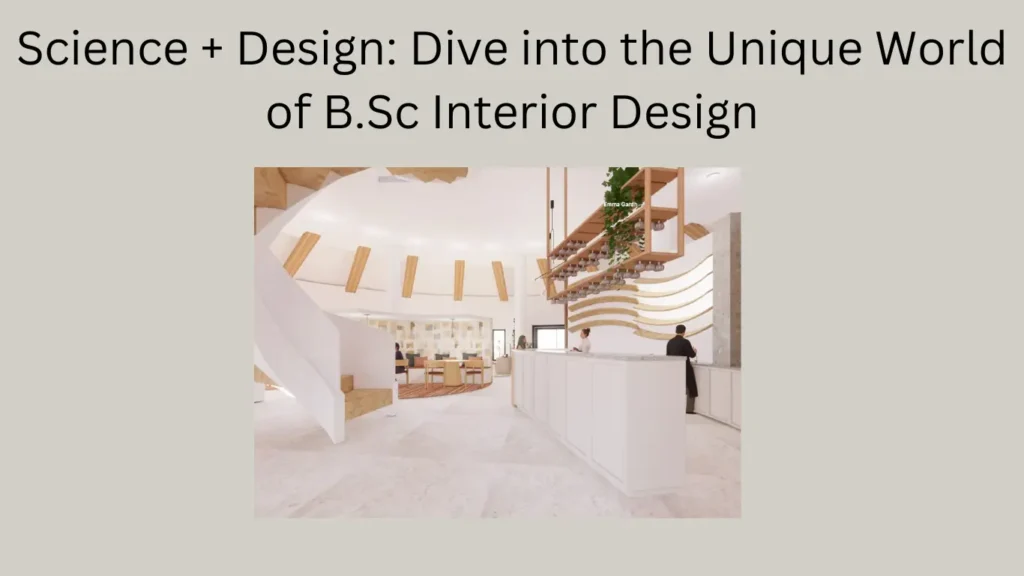When we think of science, images of laboratories and experiments often come to mind. On the other hand, design conjures up visions of creativity, aesthetics, and artistic flair. What if we told you there’s a field that seamlessly combines the precision of science with the boundless creativity of design? Welcome to the unique world of B.Sc Interior Design, where science and design coalesce to shape spaces in innovative and functional ways.
The Fusion of Science and Design
Interior design is no longer confined to merely choosing color palettes and arranging furniture. With the advent of technology and a growing emphasis on sustainability and functionality, the field has evolved into a discipline that integrates scientific principles into the design process.
B.Sc Interior Design programs delve into the scientific aspects of design, incorporating elements like environmental psychology, architectural principles, and material science. This intersection of science and design equips students with a holistic understanding of how spaces impact human behavior, well-being, and the environment.
Environmental Psychology: Understanding the Human Element
One of the fascinating aspects of B.Sc Interior Design is the exploration of environmental psychology. Students learn how different design elements influence human emotions, behavior, and overall well-being. From color psychology to spatial layouts that enhance productivity, interior designers are armed with scientific insights that go beyond the surface aesthetics.
Architectural Principles: Building the Foundation
Science plays a pivotal role in understanding the structural and architectural aspects of interior spaces. B.Sc Interior Design programs often include courses that delve into architectural principles, providing students with a solid foundation in the structural aspects of designing interiors. This knowledge not only enhances the aesthetic appeal of spaces but also ensures that designs are functional and sustainable.
Material Science: Crafting with Purpose
In the world of B.Sc Interior Design, the selection of materials goes beyond aesthetics. Material science is a key component, as students explore the properties and sustainability of various materials used in interior design. This scientific approach ensures that the materials chosen not only contribute to the visual appeal but also align with principles of durability, safety, and environmental consciousness.
Technology Integration: Bridging the Gap
Advancements in technology have revolutionized the field of interior design. B.Sc Interior Design programs incorporate the latest tools and software that allow students to visualize and conceptualize designs in a virtual space. This integration of technology not only enhances the design process but also prepares students for the evolving demands of the industry.
A Sustainable Approach: Designing for the Future
With a growing awareness of environmental issues, B.Sc Interior Design programs emphasize sustainable design practices. Students explore ways to minimize environmental impact through energy-efficient designs, the use of eco-friendly materials, and incorporating sustainable practices into their projects. This commitment to sustainability reflects a conscientious approach to design that considers the long-term impact on the planet.
The Future of B.Sc Interior Design
As the world becomes more interconnected, the demand for skilled professionals who can seamlessly blend science and design is on the rise. B.Sc Interior Design graduates are not only equipped with a creative eye but also possess a deep understanding of the scientific principles that underpin their designs. This unique combination positions them as valuable contributors to the ever-evolving field of interior design.
In conclusion, B.Sc Interior Design offers a dynamic and holistic approach to designing spaces by marrying the worlds of science and design. The graduates of these programs emerge as adept professionals who can create aesthetically pleasing, functional, and sustainable spaces that cater to the needs and well-being of the occupants. As we look to the future, the fusion of science and design will continue to shape the way we experience and interact with the spaces around us.
For further Inquires Contact Us
FAQs
1. What makes B.Sc Interior Design different from traditional interior design programs?
- Answer: B.Sc Interior Design stands out by integrating scientific principles, architectural knowledge, and a focus on sustainability, offering a comprehensive approach beyond the aesthetics.
2. How does environmental psychology play a role in B.Sc Interior Design?
- Answer: Environmental psychology in B.Sc Interior Design explores how design influences human emotions and behavior, ensuring that spaces are not only visually appealing but also contribute to occupant well-being.
3. Can B.Sc Interior Design graduates work in traditional design roles?
- Answer: Yes, B.Sc Interior Design graduates are well-equipped for traditional design roles and beyond. Their scientific understanding enhances their ability to create functional and aesthetically pleasing spaces.
4. What technology skills do B.Sc Interior Design students acquire during the program?
- Answer: Students gain proficiency in the latest design tools and software, allowing them to visualize and conceptualize designs in a virtual space, staying abreast of technological advancements in the field.
5. How does B.Sc Interior Design contribute to sustainability in design?
- Answer: B.Sc Interior Design programs emphasize sustainable practices by educating students on eco-friendly materials, energy-efficient designs, and environmentally conscious choices, promoting a responsible and sustainable approach to design.

